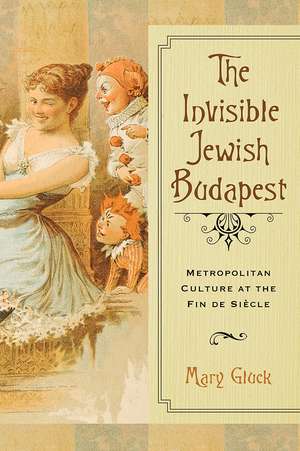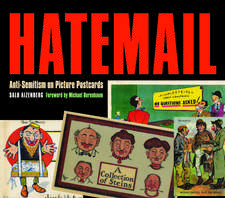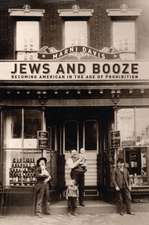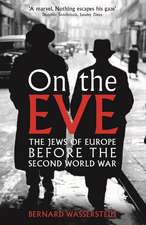The Invisible Jewish Budapest: Metropolitan Culture at the Fin de Siècle: George L. Mosse Series in the History of European Culture, Sexuality, and Ideas
Autor Mary Glucken Limba Engleză Paperback – 30 iul 2019
Budapest at the fin de siècle was famed and emulated for its cosmopolitan urban culture and nightlife. It was also the second-largest Jewish city in Europe. Mary Gluck delves into the popular culture of Budapest’s coffee houses, music halls, and humor magazines to uncover the enormous influence of assimilated Jews in creating modernist Budapest between 1867 and 1914. She explores the paradox of Budapest in this era: because much of the Jewish population embraced and promoted a secular, metropolitan culture, their influence as Jews was both profound and invisible.
| Toate formatele și edițiile | Preț | Express |
|---|---|---|
| Paperback (1) | 144.97 lei 43-57 zile | |
| University of Wisconsin Press – 30 iul 2019 | 144.97 lei 43-57 zile | |
| Hardback (1) | 239.80 lei 22-36 zile | |
| University of Wisconsin Press – 11 apr 2016 | 239.80 lei 22-36 zile |
Din seria George L. Mosse Series in the History of European Culture, Sexuality, and Ideas
-
 Preț: 119.08 lei
Preț: 119.08 lei -
 Preț: 166.01 lei
Preț: 166.01 lei -
 Preț: 338.36 lei
Preț: 338.36 lei -
 Preț: 143.79 lei
Preț: 143.79 lei - 19%
 Preț: 433.43 lei
Preț: 433.43 lei - 19%
 Preț: 432.54 lei
Preț: 432.54 lei -
 Preț: 263.72 lei
Preț: 263.72 lei -
 Preț: 297.44 lei
Preț: 297.44 lei -
 Preț: 282.91 lei
Preț: 282.91 lei -
 Preț: 154.26 lei
Preț: 154.26 lei -
 Preț: 245.82 lei
Preț: 245.82 lei -
 Preț: 231.53 lei
Preț: 231.53 lei -
 Preț: 250.82 lei
Preț: 250.82 lei -
 Preț: 246.19 lei
Preț: 246.19 lei -
 Preț: 306.34 lei
Preț: 306.34 lei -
 Preț: 305.89 lei
Preț: 305.89 lei -
 Preț: 132.03 lei
Preț: 132.03 lei -
 Preț: 279.45 lei
Preț: 279.45 lei -
 Preț: 181.22 lei
Preț: 181.22 lei -
 Preț: 189.95 lei
Preț: 189.95 lei -
 Preț: 251.23 lei
Preț: 251.23 lei -
 Preț: 190.51 lei
Preț: 190.51 lei -
 Preț: 315.95 lei
Preț: 315.95 lei - 23%
 Preț: 475.36 lei
Preț: 475.36 lei -
 Preț: 314.03 lei
Preț: 314.03 lei - 23%
 Preț: 482.44 lei
Preț: 482.44 lei - 8%
 Preț: 462.20 lei
Preț: 462.20 lei - 23%
 Preț: 482.60 lei
Preț: 482.60 lei -

Preț: 144.97 lei
Nou
Puncte Express: 217
Preț estimativ în valută:
27.74€ • 29.04$ • 22.95£
27.74€ • 29.04$ • 22.95£
Carte tipărită la comandă
Livrare economică 07-21 aprilie
Preluare comenzi: 021 569.72.76
Specificații
ISBN-13: 9780299307745
ISBN-10: 0299307743
Pagini: 240
Ilustrații: 40 b-w illus.
Dimensiuni: 152 x 229 x 18 mm
Greutate: 0.36 kg
Ediția:1
Editura: University of Wisconsin Press
Colecția University of Wisconsin Press
Seria George L. Mosse Series in the History of European Culture, Sexuality, and Ideas
ISBN-10: 0299307743
Pagini: 240
Ilustrații: 40 b-w illus.
Dimensiuni: 152 x 229 x 18 mm
Greutate: 0.36 kg
Ediția:1
Editura: University of Wisconsin Press
Colecția University of Wisconsin Press
Seria George L. Mosse Series in the History of European Culture, Sexuality, and Ideas
Recenzii
“A profoundly insightful analysis.”—Times Literary Supplement
“This book does not disappoint. On the contrary, Gluck has produced a true tour de force, seamlessly wedding together the most engaging aspects of Hungarian Jewish history, cultural, and urban life.”—Hungarian Studies Review
“In this fascinating, well-documented history of short-lived Jewish Budapest, Mary Gluck presents the questions of modernity and of Jewish identity as the central dynamics of this culture. . . . Both scholarly and entertaining.”—Jewish Currents
“Remarkable historical detective work has brought this book to life. . . . Beautifully written.”—Journal of Modern History
“The Invisible Jewish Budapest has a truly bold vision that is expressed in subtle, poignant analyses of the many cultural layers of turn of the century Budapest. . . . [Gluck] has descended into the underbelly of the golden age of Hungarian Jewry, and emerged with a diamond.”—Hungarian Historical Review
Notă biografică
Mary Gluck is a professor of history and Judaic studies at Brown University. She is the author of Georg Lukács and His Generation, 1900–1918 and Popular Bohemia: Modernism and Urban Culture in Nineteenth-Century Paris.
Descriere
In this ground-breaking history, Gluck explores the influence of the Jewish population in creating the modernist Budapest, highlighting how at the turn of the century many assimilated Jews promoted a secular, metropolitan culture, causing their impact to be both profound and invisible.
Cuprins
List of Illustrations
Acknowledgments
Introduction: Jewish Budapest as a Symbolic Space
1 Cultural Visions of the Emerging City
2 The Jewish Question and the Paradox of Hungarian Liberalism
3 A Jewish Politician in a Divided Public Space
4 The Jewish Humor Magazine and Collective Self-Parody
5 The Scandal of the Budapest Orpheum
6 Critical Cross-Dressing and Jewish Bourgeois Identity
Epilogue: The Waning of Jewish Budapest after World War I
Notes
Index
Acknowledgments
Introduction: Jewish Budapest as a Symbolic Space
1 Cultural Visions of the Emerging City
2 The Jewish Question and the Paradox of Hungarian Liberalism
3 A Jewish Politician in a Divided Public Space
4 The Jewish Humor Magazine and Collective Self-Parody
5 The Scandal of the Budapest Orpheum
6 Critical Cross-Dressing and Jewish Bourgeois Identity
Epilogue: The Waning of Jewish Budapest after World War I
Notes
Index














